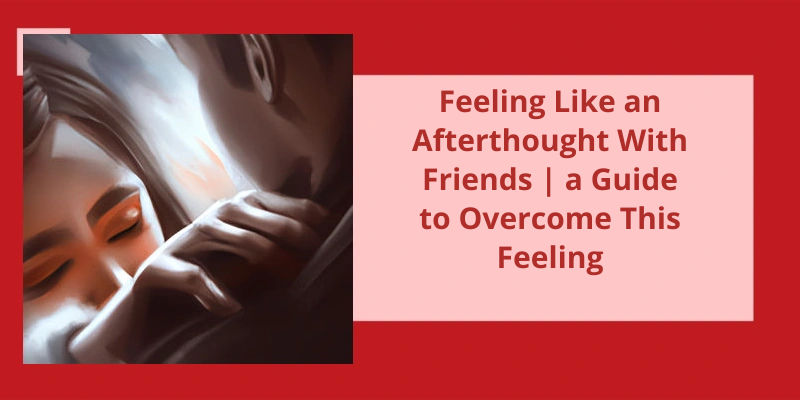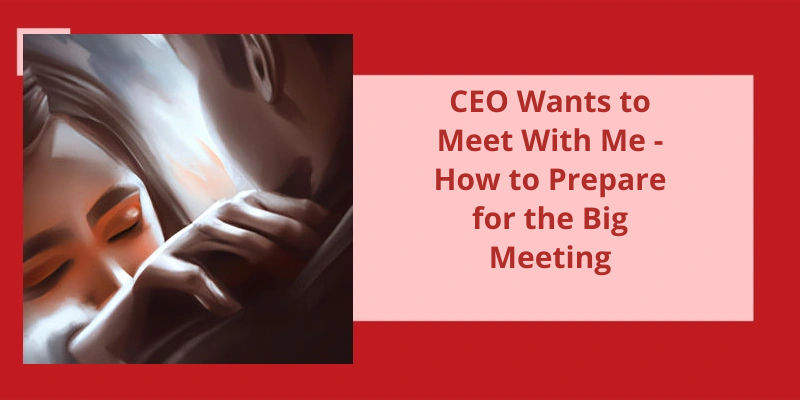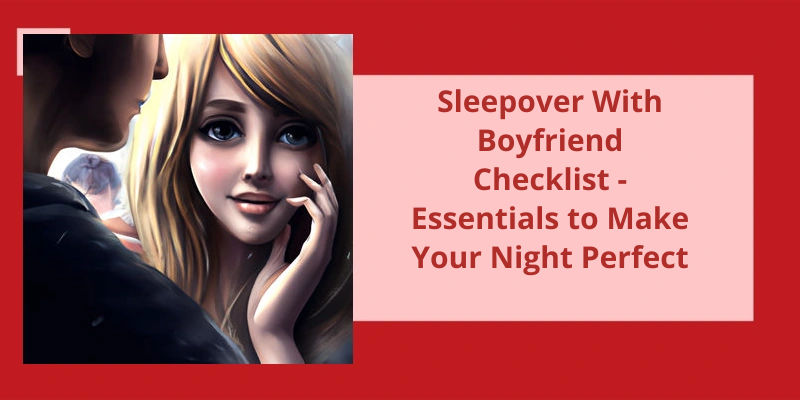As humans, we all crave connection and belonging, an innate need that’s ingrained in our DNA. However, despite this fundamental desire, it isn’t uncommon to feel like an afterthought with friends, a sensation that can be incredibly isolating. It can often seem like everyone else has a clear social circle, with a group of friends that they can rely on, while you’re left on the periphery, unsure of where you fit in. This feeling isn’t only demoralizing, but it can also lead to significant negative health consequences, such as depression and anxiety. Therefore, it’s crucial to understand why we may feel this way, and what we can do about it.
What to Do When Your Friends Don T Want to Be Friends With You Anymore?
Losing friends can be a painful experience, and it’s natural to feel a range of emotions when this happens. Whether it’s a drift apart or a sudden ending, it’s essential to give yourself time to process your feelings. It’s essential to take some time to reflect on the relationship and come to terms with the fact that things have changed. It’s okay to grieve the loss of a friendship because it’s natural to feel a sense of loss when something that used to be essential to us is no longer available.
It’s essential to remind yourself that friends come and go throughout life, and sometimes the end of a friendship is merely part of the natural ebb and flow of life. While it’s hard to let go of the memories and the times shared with someone, it’s also important to recognize that new friendships are possible and that you’re capable of moving forward. Instead of focusing on the past, it’s vital to focus on new opportunities that might present themselves.
When it comes to dealing with the aftermath of a lost friendship, it’s essential to avoid contact with the person who no longer wishes to be friends. This includes unfollowing their social media profiles and avoiding places or events where you might run into them. It’s essential to give yourself the space you need to heal and process your emotions without the added stress of ongoing interactions or reminders of what used to be.
One step that can be particularly helpful in moving on from a lost friendship is to put away or get rid of pictures and mementos that remind you of the person. While it can be hard to let go of physical reminders of the past, it’s essential to consider how having them around might impact your emotional well-being. Sometimes, getting rid of things can be freeing and create space for new opportunities without the burden of the past.
In addition to these practical steps, another helpful tactic is to write down how you feel. Putting your feelings into words can often offer a sense of relief and clarity. It may be helpful to write a letter to the person who no longer wishes to be friends, even if you never send it. Writing can help you process your emotions and give you a sense of closure.
Lastly, it can be helpful to find someone to talk to about your feelings. This could be a trusted friend, family member, or even a professional counselor. Having the support of someone who cares and is willing to listen can be invaluable during this time of transition. A person who isn’t emotionally attached to the situation can often offer an objective perspective and provide guidance on how to move forward. Ultimately, it’s important to be kind to yourself during this time and give yourself the space and support you need to heal.
Coping With the Feeling of Rejection From a Lost Friendship
- Allow yourself to feel your emotions
- Talk to someone you trust about how you’re feeling
- Don’t blame yourself for the situation
- Focus on the positive relationships in your life
- Engage in self-care activities, such as exercise or meditation
- Consider reaching out to your former friend to try to reconcile, if appropriate
- Remember that it’s okay to move on and make new friendships
- Seek professional help if your feelings of rejection become overwhelming or persistent
Maintaining close relationships with friends can be a rewarding experience, but it takes work and effort on both sides. However, sometimes it may feel like you’re drifting apart from your friends, and it’s not always clear why. In this article, we will explore some common reasons why we might feel distant from our friends and offer some advice on how to reconnect.
Why Do I Feel Distant From All My Friends?
Perhaps you’re going through a difficult time, and your friends havent been able to meet your emotional needs. Without the right level of emotional support, you may feel as though you don’t belong or that your friends don’t care about you. It’s natural to feel disconnected when you believe that your friends aren’t present for you. Alternatively, if you’ve been avoiding interactions with your friends, perhaps due to a busy schedule or other commitments, then your friendship may have faded away over time.
It’s also possible that you’ve grown apart from your friends. Our interests and priorities change as we grow older, and this can often lead to a breakdown in friendships. When we no longer share the same values or beliefs as our friends, we tend to drift apart. In such cases, it may be beneficial to reconnect with your friends and find common ground to revive the friendship.
Another possibility is that you haven’t found the right group of friends. Sometimes, we meet people who we think are our friends, but we don’t share meaningful connections with them. Friendships aren’t just about being in each others company; they’re about sharing an emotional bond. It could be useful to explore new interests or join groups that align with your values to meet people who share similar interests.
Perhaps you’re experiencing a mental health issue or going through a difficult break-up, and you don’t feel comfortable discussing these topics with your friends. In such cases, it could be useful to seek professional help or support groups where you can find people who understand what you’re going through.
Coping Mechanisms for Dealing With the Loss of a Friendship.
- Reach out to other friends for support and company
- Distract yourself with activities that make you happy
- Write down your thoughts and feelings in a journal
- Allow yourself to feel and process your emotions
- Seek the help of a therapist or counselor if needed
- Engage in self-care practices such as exercise and proper nutrition
- Be kind to yourself and practice self-compassion
- Consider joining a support group for individuals experiencing the loss of a friendship
Source: Feeling Disconnected From Friends? Reasons And Solutions
Why Do I Feel Like I Don T Want to Be Friends With My Friends Anymore?
Feeling like you don’t want to be friends with your friends anymore isn’t an unusual experience. Relationships, both romantic and platonic, are subject to change, sometimes for reasons outside our control. As people, we’re constantly evolving, and our priorities and interests shift as we navigate different stages of life. It’s natural for our connections to others to reflect these changes.
Recognizing that we no longer feel fulfilled or valued in certain friendships can be a difficult but necessary step in personal growth. Being honest with ourselves and others about our feelings can help us move forward and find relationships that align with our current values and goals. That being said, it’s important to approach these conversations with empathy and respect, acknowledging the memories and positives experiences we may have shared with these individuals.
At times, we may find ourselves feeling frustrated or disappointed in our friends actions or behavior. These instances can create a rift in the relationship, causing us to question our trust and loyalty to that individual. Open communication and expressing our concerns can help alleviate some of these tensions and potentially lead to a stronger, more honest friendship.
Not wanting to be friends with someone anymore doesn’t necessarily mean we no longer care for them or wish them ill. It simply means that we’re prioritizing our own emotional health and personal growth over the familiarity of maintaining a relationship that no longer serves us.
Coping With the Emotions That Come With Ending a Friendship
Coping with the emotions that come with ending a friendship can be difficult. It’s important to give yourself time to grieve the loss, express your feelings to a trusted friend or therapist, and focus on self-care activities that bring you comfort and joy. Remember that it’s okay to prioritize your own well-being and to set boundaries with people who may not be good for you in the long run.
As we journey through life, the people we meet aren’t guaranteed to remain in our lives forever, and that includes our friends. While some friendships can stand the test of time, others may naturally come to an end. In such cases, it’s perfectly acceptable to reevaluate those relationships and determine if they still bring value to our lives. Ending a friendship can be a difficult decision, but it’s an important part of prioritizing our emotional well-being.
Is It OK to Want to End a Friendship?
Friendships are a unique type of relationship that can bring immense joy and happiness, but they can also bring stress and anxiety. Sometimes, friendships can become toxic or draining, leaving us feeling unsupported or hurt. In these situations, it’s okay to want to end the friendship. It’s important to recognize when the relationship is no longer serving either person and to acknowledge that it may be time to move on.
Doing so is a natural part of growing and evolving as a person. It can be scary to walk away from something that was once a significant part of our lives, but it’s essential to trust ourselves and make choices that allow us to live as authentically and truthfully as possible. Sometimes, the end of a friendship can lead to newfound clarity and growth, allowing us to discover new opportunities and meaningful connections.
It’s important to acknowledge and explore why you feel this way, as isolating yourself completely can be detrimental to your mental health and overall wellbeing. There are ways to navigate your feelings and potentially rebuild or strengthen your friendships in healthy ways.
Why Do I Feel Like I Don’t Want to Be Around With My Friends?
If you find yourself feeling anxious or stressed when you think about socializing with your friends, it may be time to reflect on why youre feeling this way. It’s possible that you’ve unresolved issues or conflicts with your friends that are making you uncomfortable. If this is the case, it’s important to address these issues directly and honestly to find a resolution.
Another reason why you may not want to spend time with your friends is that you feel like youre not on the same page anymore. Perhaps youve outgrown some of your old friendships or youve developed different interests and lifestyles. In this case, it’s perfectly normal to feel like it’s time to move on and form new friendships that align better with your current values and goals.
It’s also possible that youre feeling burned out from too much social interaction. As humans, we all have a limited capacity for socializing, and it’s important to take time to recharge and rest when we need it. If youve been particularly social lately, it’s possible that youre experiencing a bit of burnout and need to carve out some time for yourself to recharge.
Finally, it’s important to recognize that not everyone is a social butterfly, and thats okay! Some people are naturally more introverted and prefer to spend time alone or with smaller groups of people. If this describes you, it’s important to honor your own preferences and needs, rather than feeling like you’ve to conform to societys expectations of what it means to be a “social” person.
Overall, there are many reasons why you might feel like you don’t want to be around your friends. Whether it’s due to unresolved issues, a change in interests, burnout, or simply individual preferences, it’s important to recognize these feelings and take steps to address them. By doing so, you’ll be better equipped to form meaningful connections with the people in your life and cultivate fulfilling relationships that support your overall well-being.
However, when those feelings of being left out become persistent and overwhelming, it may be a sign of a deeper issue that needs to be addressed. In this article, we will explore the reasons why someone may feel left out among their friends and what they can do to overcome those feelings and strengthen their relationships.
Is It Normal to Feel Left Out With Friends?
However, when the feeling of being left out becomes a consistent source of distress, it may be worth examining why. It could indicate a lack of communication or understanding with the group, possible personality conflicts or misunderstandings. It’s important to address these concerns and try to communicate your feelings effectively with your friends. It may also be a sign that it’s time to seek out new social circles or friendships where you feel more accepted.
It’s important to remember that everyone experiences feeling left out or excluded at some point in their lives, whether it be in a social setting or even in a professional environment. It’s a universal human experience. It’s also important to understand that sometimes the reason for feeling left out may not have anything to do with you personally. The dynamics of social groups can be complicated and sometimes complicated relationships exist between individuals in those groups. Being able to recognize that it’s not always about you can be an empowering realization.
When youre experiencing the feeling of being left out, it’s common to want to retreat into yourself and isolate yourself from others. However, this can often perpetuate the cycle of loneliness and feeling disconnected. Rather than withdrawing, try reaching out to others. Join clubs or activities, volunteer, or take classes. Youll increase your chances of meeting more people with similar interests and finding connections that bring you joy.
It’s also important to remember that friendships aren’t stagnant. They ebb and flow, and it’s natural for relationships with friends to change over time. It’s possible that your current group of friends may no longer be meeting your emotional needs, and thats okay. You can still appreciate the memories and good times you’ve shared with them, while simultaneously seeking out new connections and relationships.
It can be difficult and painful, but it’s important to remember that you aren’t alone in your feelings. It’s a great opportunity to reflect on your needs and values, communicate effectively with those around you, seek new connections, and grow as a person. Remember to be kind to yourself and give yourself the time and space you need to heal and move forward.
How to Effectively Communicate With Friends When Feeling Left Out.
When feeling left out with friends, it’s important to be honest and open with them about your feelings. Express how their actions are affecting you and ask for their perspective on the situation. Avoid blaming or accusing anyone and listen to each other’s thoughts and feelings. Work together to find a solution that makes everyone feel included and valued.
Conclusion
The emotions that come with this feeling might be rooted in past experiences of rejection or abandonment, and the perception of being left out can further reinforce negative self-beliefs. However, it's important to remember that everyone experiences moments of insecurity or self-doubt, and reaching out to friends or seeking support from a therapist can be helpful in managing these emotions. If the feeling of being an afterthought continues to persist, it could be an indication of a need to reassess one's values and priorities and seek out friendships that align with them. Ultimately, it's possible to overcome the feeling of being an afterthought with friends and cultivate fulfilling relationships with people who appreciate and value our presence.






